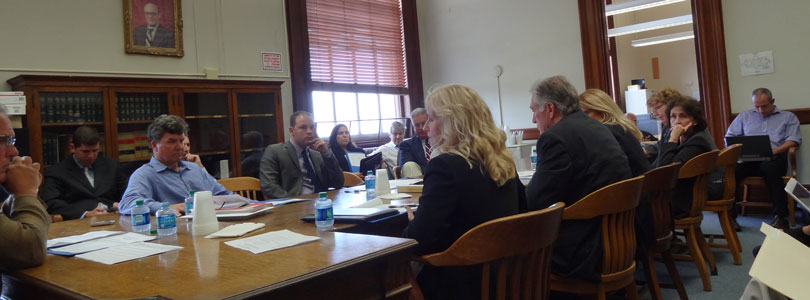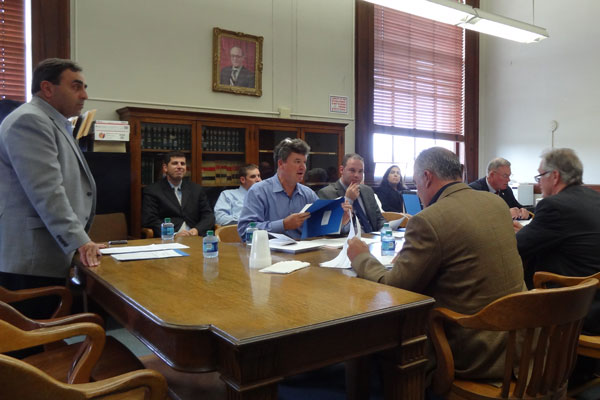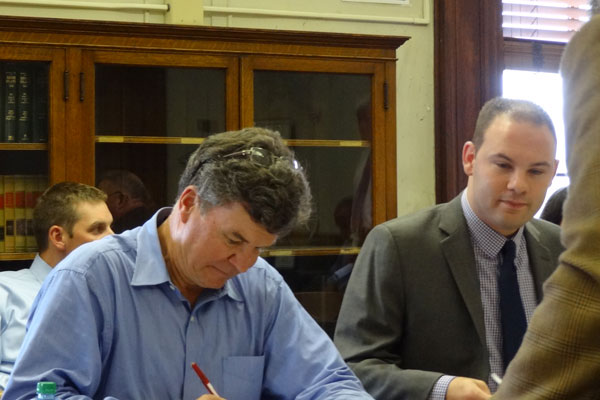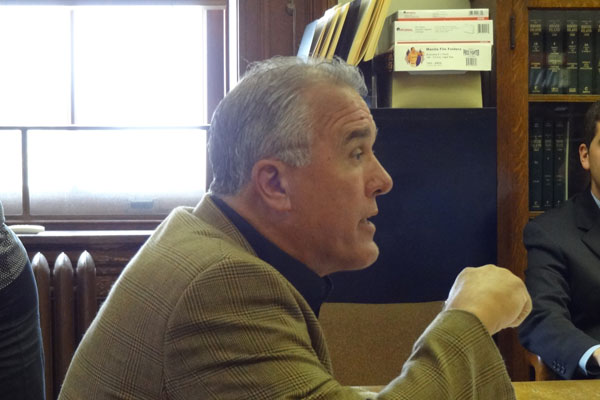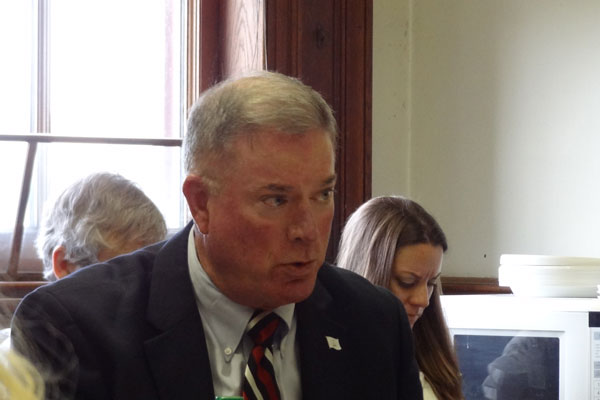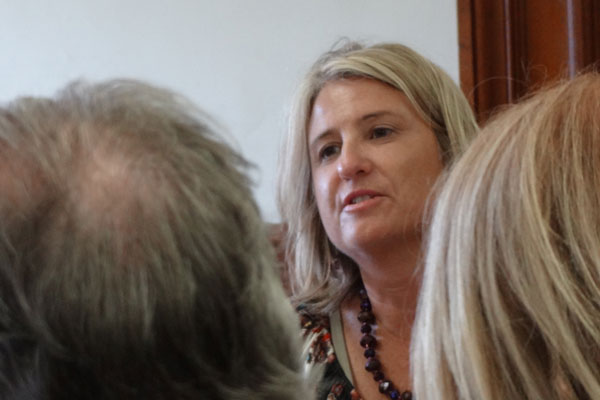09/12/13 – Commission to Study the Sales Tax Repeal
4:02 p.m.
Herewith, my first liveblog of a legislative commission meeting. Who said these things are useless? The as-yet chairmanless meeting kicks off with Speaker Gordon Fox’s Chief of Staff, Frank Anzeveno, at the head of the table.
4:05 p.m.
Rep. Jan Malik (sponsor of the sales tax repeal bill) was elected chairman of the commission, nominated by Sen. Walter Felag, without opposition.
4:06 p.m.
Sen. Pearson (right) nominates Felag (left) as vice-chair. No opposition.
Malik moves to the head of the table.
4:08 p.m.
As they discuss dates to meet, here’s the legislature’s release about the commission. Interesting to know that Senate President Teresa Paiva-Weed appointed Linda Katz, from the Economic Progress Institute, as the taxpayer representative. (That’s a little bit of a… let’s say… counter-intuitive appointment for which I’m seeking more information.)
4:10 p.m.
Apparently, Cranston Mayor Allan Fung is looking for a replacement for himself as the League of Cities and Towns representative on the commission (very interesting). Also, it looks like Kate Brewster is replacing Linda Katz.
4:13 p.m.
Malik is unabashed about his intention with the commission: to tackle the impression that eliminating the sales tax cannot be done.
4:14 p.m.
Commissioner, Rep. Joseph McNamara is saying he’d like to look at data following up on recent, targeted tax increases (like on dog groomers and high-end coats).
East Providence could someday look like route 1 in Attleboro, he says.
4:16 p.m.
Interesting phrase from McNamara, speaking of targeted tax increases: “Is the juice worth the squeeze?”
4:17 p.m.
Revenue Director Rosemary Booth Gallogly says she’ll appoint Director of Revenue Analysis Paul Dion to the commission to answer such questions, but she’s concerned about the amount of work that can mount when projections and models start being requested.
4:20 p.m.
Laurie White, President of the Greater Providence Chamber of Commerce, says there may be concern among her members if the sales tax is just lowered and broadened.
Dale Venturini, President and CEO of the Rhode Island Hospitality Association, is most concerned about “parity,” meaning equalizing restaurant taxes with retail and RI with other states.
4:23 p.m.
Rep. Patricia Morgan says we should reduce or eliminate the sales tax without “offloading taxes onto another target,” like the income tax. She cites New Hampshire as an example, but that’s not accurate. NH doesn’t have income tax either and just plain has a much lower tax burden than RI, per capita.
But I like her conclusion: We shouldn’t try to be revenue neutral, but reduce the tax burden.
4:26 p.m.
Morgan mentioned a study showing that RI has a high amount of cigarette smuggling because of the high taxes. Malik says Massachusetts just jacked up its cigarette taxes, and his near-the-border liquor store moved from around $450 in cigarette sales per week to $12,000-15,000.
4:30 p.m.
Brewster (appointed to represent the taxpayer, remember) wants any tax reform to be revenue neutral, meaning no reduction of taxes on the taxpayer.
4:33 p.m.
Felag is saying the General Assembly has a habit of not looking at the diminishing returns on increases in taxes, where new tax doesn’t bring in the revenue that was promised because people change their behavior. Mentions the Sakonnet River Bridge toll.
Wants the most bang for the buck. “What if we make it 4% or 5% or 6%? Is that enough to change behavior?”
4:34 p.m.
By the way, Kathy Gregg from the Providence Journal is here, as is the AP’s David Klepper.
4:37 p.m.
John Simmons, from the Rhode Island Public Expenditure Council (RIPEC) is speaking very quietly, so I can’t hear much of what he’s saying. Sounds like he likes Rhode Island’s big and broad tax structure, because it insulates the government’s budget from market forces. (That’s in keeping with the thinking in this state, which is that public policy’s first goal is to protect the state government, not the people of Rhode Island.)
4:40 p.m.
McNamara is saying he’s recently had a revelation: when voting in favor of (for example) the tax on high-end clothing, he never even considered adverse consequences. If somebody could afford an expensive suit, he says, he figured they could afford the tax. But he’s since been approached by small boutiques that are now dying because they can’t attract out-of-state customers.
(Picture the clouds opening and a beam of light shooting through the window…)
4:43 p.m.
Venturini emphasizes the cost of collecting and processing sales tax, on businesses.
4:44 p.m.
Malik: “The businesses in Rhode Island are our heart, and without them, Rhode Island is going to be a ghost town.”
4:46 p.m.
Morgan asked about studies related to cross-border shopping. John Simmons from RIPEC says he hasn’t seen a good study (cough). As he elaborates, I can tell you that he clearly hasn’t looked very hard.
4:51 p.m.
Malik says it’s hard to figure out “what we tax and what we don’t tax.” He mentions big bags of chips versus small bags of chips, because you might eat one in your car and not the other, etc. etc.
4:52 p.m.
Sounds like the next meeting will be September 30 at 4:00, concentrating on RI’s competitiveness. (I need to jump in here: they’re talking about all these comparisons and studies they’d like to see, but once you start looking at whole-budget structures, revenue and expenditures, it gets extremely complex and, not surprisingly, you lose an ability to get your head around it… unless you’re going to do a massive statistical analysis to tease — debatable — conclusions out of it, the tendency will be to pick and choose the lessons that a particular person likes.)
4:55 p.m.
And they’re done for this time around.

